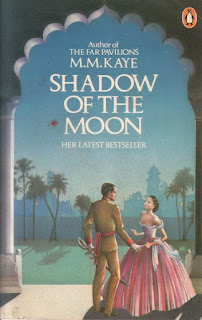Lily (Lilian), Bell (Isabella), and their mother, Mrs. Dale, live in a cottage on the estate of her brother-in-law, Squire Dale. The squire, their benefactor, is a stern implacable man who feels a responsibility to the family, yet does not exhibit affection or understanding towards them or their plight. In spite of the strained relations, the Dale women live a contented, happy life. However, their cousin, Bernard, one day brings his friend, Adolphus Crosbie home to visit and an attachment grows between him and Lily. Crosbie is a charming young man, without name or fortune, but with a charisma that captures Lily’s heart, despite his flaws of selfishness and worldliness. Does Crosbie love Lily? He certainly convinces himself that he does and as he proposes he anticipates a respectable dowry that he assumes will be bestowed upon Lily by Squire Dale. But assumptions can go awry and when Crosbie learns that Lily will be the benefactress of nothing but goodwill, her charms begin to diminish in his materialistic eyes. All attempts to convince himself that love will overcome practicalities fail and he is lured away by a daughter of an earl, Alexandrina deCourcy, of whom he once was an admirer. Weak and irresolute, Crosbie soon finds himself engaged to the girl despite his own misgivings and the threat of censure that he is certain to receive from various aspects of society.
Author Archives: cleopatra
Shadow of the Moon by M.M. Kaye
“Winter! Who ever heard of such a name?”
The Republic ~ Part I (Book I)
 |
| The Republic Jean-Leon Gerome source Wikiart |
Book I:
The dialogue begins around the year of 410 B.C. at the port of the Piraeus, a town five miles from Athens. As we read of the overthrow of the Athenian democracy in 404 B.C. in Thucydides’, History of the Peloponnesian War, Socrates begins to ask the questions about the benefits of democracy and builds his Republic on those ideas. He begins by questioning the benefits and results of Justice.
History of the Peloponnesian War by Thucydides
“Thucydides, an Athenian, wrote the history of the war between the Peloponnesians and the Athenians, beginning at the moment that it broke out, and believing that it would be a great war, and more worthy of relation than any that had preceded it.”
Ah, the lovely Landmark editions! Where would I be without them? I would have no idea the location of Thrace or Thessaly or Corinth, etc. and therefore have less of a concept of the complicated dynamics that influenced various states in their struggles to fit into the puzzle of Hellenistic supremacy!
Thucydides account of the war between Sparta and Athens falls just after the events recounted in Herodotus’ The Histories. Athens, high on her victory over the very powerful Xerxes, king of Persia, during the Persian Wars, is feeling rather self-important and she appears to be rushing around with her forces, conquering states here and subduing enemies there. And while Athens becomes more powerful, the Lacedaemonians of Sparta are left to conduct their somewhat mundane and traditional existence. But Athens’ power begins to worry them and while they were allies during the Persian Wars, this brotherhood appears to be heading towards a separation that could prove bloody as well as costly.
July/August ~ Life Goes By At The Speed of Light
 |
| Once Upon A Time (c. 1850) Carl Spitzweg source Wikiart |
I cannot believe where the time has gone. It’s passed by so quickly that my mind is spinning. Which is not good. Lately I’ve been thinking about balance in life, and how we find it. Is it only people who live in large cities who have this problem, as events and opportunities are much more accessible? Or do we all do it to ourselves and are “nuts,” as my scorekeeping liaison is fond of calling me? I have a feeling there are many answers to this question, all of them complex and none of them clear.
The Republic ~ Introduction
“Socrates: I walked down to the Piraeus yesterday with Glaucon the son of Ariston to make my prayers to the goddess.”
Well, I’ve finished History of the Peloponnesian War (except for my final post), yet I’m afraid I’m going to continue on the same track with The Republic and put a number of my readers to sleep. But I am enjoying this history project ….. as we’ve meandered through Herodotus, then Thucydides, and now Plato, you do see changes and developments within the Greek culture and worldview that can’t be ignored. And since our civilization, to a certain extent, grew out of it, I believe it’s valuable to learn something about that development. I anticipate that Plato will be more interesting, but possibly more frustrating. It doesn’t seem like it was only the ancients who wanted to strangle Socrates …..
The History of the Peloponnesian War – Book VIII
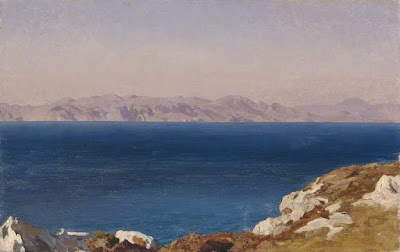 |
| Isle of Chios Frederic Leighton source ArtUK |
History of the Peloponnesian War
The History of the Peloponnesian War – Book VII
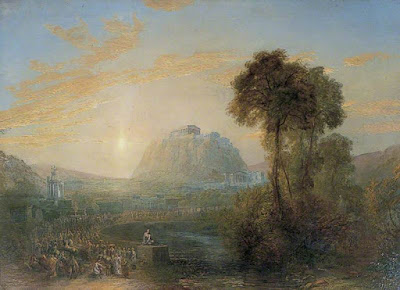 |
| A Dream of Ancient Athens Sydney Herbert source ArtUK |
History of the Peloponnesian War
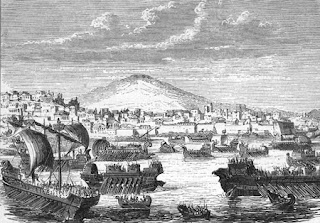 |
| Athenian navy, Sicily source Wikimedia Commons |
The History of the Peloponnesian War – Book VI
 |
| Ruin of Greek Theatre, Taormina, Sicily Ferdinand Georg Waldmüller source Wikiart |
History of the Peloponnesian War
History of the Peloponnesian War – Book V
Book V: After the armistice is concluded, Cleon, emboldened by his success in Pylos, leads an expedition through Thrace to Torone where he takes Torone, destroying some of Brasidas’ fortifications. He makes Eion his base and Brasidas makes Amphipolis his, whereupon Cleon attacks, however in his delusions of grandeur he misjudges his ability, and tries to retreat too late. In the fighting, Cleon is killed but his nemesis, Brasidas, is also fatally wounded.
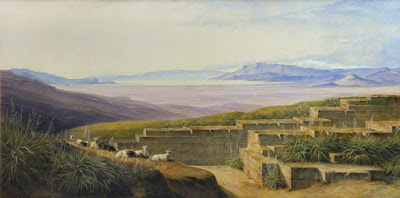 |
| Argos from Mycene (1884) Edward Lear source ArtUK |


